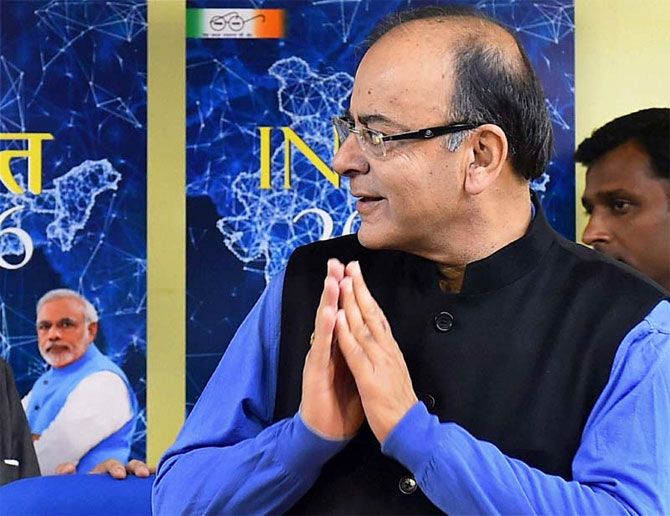 At a time when major economies have increased spending, India will have to do the same.
At a time when major economies have increased spending, India will have to do the same.
When Finance Minister Arun Jaitley presents the 2017-18 Budget on February 1, he may announce a fiscal deficit target close to 3.5 per cent of gross domestic product.
A government official said this would enable a higher spend on infrastructure, housing, the social sector and other flagship schemes of Prime Minister Narendra Modi’s government.
According to the existing fiscal responsibility and budget management (FRBM) road map, the fiscal deficit target for the next year should be three per cent of GDP.
The current financial year’s target of 3.5 per cent is, however, likely to be met, due to higher-than-budgeted direct and indirect tax proceeds.
The upcoming Budget might carry forward the theme of Modi’s New Year’s eve speech announcing sops for the poor, rural population, and the middle and lower middle classes.
It is also expected to continue the Centre’s public spending push in infrastructure and renew focus on job creation, health, education, women and children and on schemes such as the National Rural Employment Guarantee Act, Pradhan Mantri Awas Yojana, and Krishi Sinchayee Yojana.
The official said, at a time when major economies have increased spending, India will have to do the same.
“The FM may depend on higher budgetary allocation, in part through increased borrowing, as well as off-budgetary resources to counter global slowdown and the impact of demonetisation on the economy.”
A panel to look into the future FRBM road map, headed by former revenue and expenditure secretary N K Singh, is expected to submit its recommendations to Jaitley on January 16, after multiple delays, sources said.
It was earlier expected to be submitted on October 30 last year.
The panel may provide the necessary spending room Budget makers seek. Sources said the panel will not recommend a fiscal deficit target of 3 per cent of GDP for 2017-18. It could instead be closer to 3.5 per cent.
This will mean amending the FRBM Act or replacing it.
According to officials, it may provide a six-to-eight-year FRBM road map, wherein the deficit at the end will be ‘set in stone’. But in the intervening years, the Centre may have flexibility in terms of increasing spending.
The panel may also suggest pauses in reducing fiscal deficit targets.
The current FRBM road map mandates a reduction in the gap between total expenditure and total revenue, year after year.
“A pause would mean that if the finance minister achieves the fiscal deficit target for any given year, he could stay at that number as a percentage of GDP for more years before reducing it further,” said another official.
The FRBM panel is also expected to recommend certain conditions under which extra spending is necessary and, hence, the Centre could have relaxed fiscal deficit targets of up to 3.5 per cent of GDP, or even higher.
Most analysts are also expecting a relaxation on that front. In a research note on Friday, Bank of America Merrill Lynch (BofA-ML) said the budgeted target for FY18 is likely to be 3.5 per cent.
“We have always believed that the Centre should relax fiscal deficit to combat a global recession, proving to be longer than the Great Depression,” BofA-ML said.
Also, in a pre-Budget meeting with Jaitley last month, some economists are said to have advised the government to focus on increasing capital expenditure and social sector spending.
Despite years of effort to rein in fiscal deficit, the rating agencies have not upgraded their long-term sovereign ratings on India.
In such a scenario, and at a time when major developed and developing economies were increasing federal spending, India should do the same, economists say.
With private sector balance sheets still weak, the government would not only have to maintain its public spending spree but even increase it.
This is a view finding traction within the government as well.
Image: Finance Minister Arun Jaitley. Photograph: PTI Photo.











